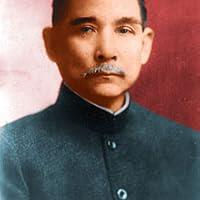
Sun Yat-Sen
Об авторе
Sun Yat-sen was a pivotal figure in the transition of China from imperial rule to a republic. Born in 1866 in Guangdong province, he studied medicine in Hong Kong but soon turned his focus to politics, advocating for the modernization and reform of China. He is best known for his role in the Xinhai Revolution of 1911, which led to the fall of the Qing Dynasty and the establishment of the Republic of China. His political philosophy, encapsulated in his book "The Three Principles of the People," emphasized nationalism, democracy, and the people's livelihood, which aimed to address the needs and aspirations of the Chinese populace.
Sun's influence extended beyond his lifetime, as he inspired a generation of leaders and reformers. His vision for a modern, unified China has left a lasting legacy in Chinese politics and is commemorated as the "Father of the Nation" in Taiwan. Despite his many challenges, including exile and political strife, Sun's commitment to his ideals and his ability to galvanize support were crucial in shaping the future of China. His contributions to the country’s political landscape resonate even today, making him a key historical figure in the narrative of China's modernization.